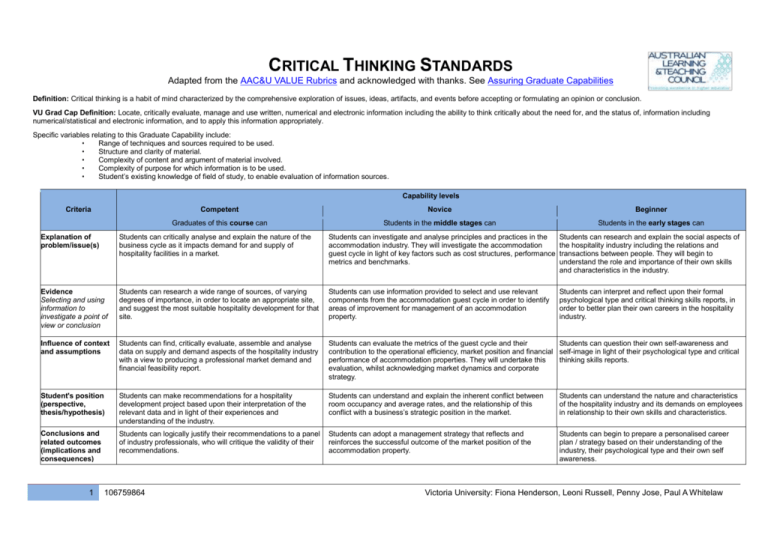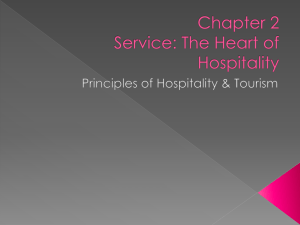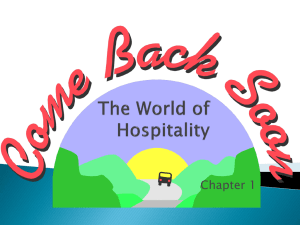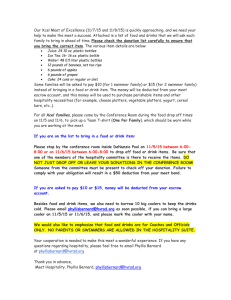Critical thinking - Assuring Graduate Capabilities
advertisement

CRITICAL THINKING STANDARDS Adapted from the AAC&U VALUE Rubrics and acknowledged with thanks. See Assuring Graduate Capabilities Definition: Critical thinking is a habit of mind characterized by the comprehensive exploration of issues, ideas, artifacts, and events before accepting or formulating an opinion or conclusion. VU Grad Cap Definition: Locate, critically evaluate, manage and use written, numerical and electronic information including the ability to think critically about the need for, and the status of, information including numerical/statistical and electronic information, and to apply this information appropriately. Specific variables relating to this Graduate Capability include: • Range of techniques and sources required to be used. • Structure and clarity of material. • Complexity of content and argument of material involved. • Complexity of purpose for which information is to be used. • Student’s existing knowledge of field of study, to enable evaluation of information sources. Capability levels Criteria Competent Novice Beginner Graduates of this course can Students in the middle stages can Students in the early stages can Explanation of problem/issue(s) Students can critically analyse and explain the nature of the business cycle as it impacts demand for and supply of hospitality facilities in a market. Students can investigate and analyse principles and practices in the accommodation industry. They will investigate the accommodation guest cycle in light of key factors such as cost structures, performance metrics and benchmarks. Students can research and explain the social aspects of the hospitality industry including the relations and transactions between people. They will begin to understand the role and importance of their own skills and characteristics in the industry. Evidence Selecting and using information to investigate a point of view or conclusion Students can research a wide range of sources, of varying degrees of importance, in order to locate an appropriate site, and suggest the most suitable hospitality development for that site. Students can use information provided to select and use relevant components from the accommodation guest cycle in order to identify areas of improvement for management of an accommodation property. Students can interpret and reflect upon their formal psychological type and critical thinking skills reports, in order to better plan their own careers in the hospitality industry. Influence of context and assumptions Students can find, critically evaluate, assemble and analyse data on supply and demand aspects of the hospitality industry with a view to producing a professional market demand and financial feasibility report. Students can evaluate the metrics of the guest cycle and their Students can question their own self-awareness and contribution to the operational efficiency, market position and financial self-image in light of their psychological type and critical performance of accommodation properties. They will undertake this thinking skills reports. evaluation, whilst acknowledging market dynamics and corporate strategy. Student's position (perspective, thesis/hypothesis) Students can make recommendations for a hospitality development project based upon their interpretation of the relevant data and in light of their experiences and understanding of the industry. Students can understand and explain the inherent conflict between room occupancy and average rates, and the relationship of this conflict with a business’s strategic position in the market. Students can understand the nature and characteristics of the hospitality industry and its demands on employees in relationship to their own skills and characteristics. Conclusions and related outcomes (implications and consequences) Students can logically justify their recommendations to a panel of industry professionals, who will critique the validity of their recommendations. Students can adopt a management strategy that reflects and reinforces the successful outcome of the market position of the accommodation property. Students can begin to prepare a personalised career plan / strategy based on their understanding of the industry, their psychological type and their own self awareness. 1 106759864 Victoria University: Fiona Henderson, Leoni Russell, Penny Jose, Paul A Whitelaw 2 106759864 Victoria University: Fiona Henderson, Leoni Russell, Penny Jose, Paul A Whitelaw VU Exemplars VU Grad Caps matrix Find, critically evaluate, synthesise and generate ideas definition through the application of complex information on a broad range of topics, for a range of purposes (15) Find, organise, critically evaluate and synthesise information on a Find, organise, evaluate and synthesise information broad range of topics (I4) on a broad range of topics for defined purposes (I3) Unit of study BHO3501 Hospitality Facilities Planning and Development BHO2282 Accommodation Management BHO1110 Introduction to Hospitality Aim The purpose of the unit of study is to introduce students to the process of planning, developing and evaluating hospitality facilities via systematic market demand analysis and feasibility study. The purpose of the unit of study is for students to acquire a functional understanding of the planning, management and operational requirements of the accommodation industry, including the principles and practices of the guest cycle. The purpose of the unit of study is to introduce students to the depth and scope of hospitality as a social concept, with an emphasis on developing an understanding the forces that shape the industry and with reference to their own skills and characteristics. Unit of Study assessment exemplars Feasibility study and presentation (Assessments 1, 3 and 4) for major assignment and marking guide Accommodation Management Report and marking rubric Personalised career plan (Major essay) and marking rubric Unit of Study assessment detail Assessment 1 – Initial data searching for a proper site (15%) Accommodation Management Report (30%) Personalised career plan (Major Essay) (30%) Word limit: 2,000 words Word limit: 1000 words (+- 10%) Word limit: 500 words You are the manager of an accommodation property. Hospitality developers need a feasible site before 1. Identify and describe the property. commencing the development process. Information about sites can be obtained from a wide range of sources including: 2. Identify the key elements of the guest cycle, including the local and international media, investment proposals, performance metrics and benchmarks that you would use to government reports, even TV programs and movies as well as analyse the performance of the property. more obvious places such as real estate websites. Your 3. Explain how each of these elements contributes to the assignment is to identify “an excellent site and the most property’s performance in terms of operating efficiency, appropriate hospitality development for that site”. You are to market position and financial performance. provide sufficient prima facie evidence (preliminary findings) to suggest that the site could sustain the proposed This task corresponds to learning outcomes* 1, 2 and 3 (see below) development. A full report is not required at this stage. and graduate capability Using Information (VU level 4). The assignment aims to help you develop analytical skills to summarise Assessment 3 – Feasibility study report (25%) and evaluate information, using a practical industry example. This Word limit: 2,000 words assignment is to be completed with a partner from your tutorial group. This assessment aims to help students develop the analytical skills required to evaluate the market and financial feasibility of a proposed development project. Students are required to conduct a market and financial feasibility study and produce a report including recommendations based on the site and proposed hospitality development identified in Assessment 1. You are required to work in group of 2 to 3. Assume that you are a group of senior consultants representing an international property development firm. An investment company would like to conduct a study to evaluate the market feasibility of establishing a brand new hospitality development at a location 3 106759864 The written assignment requires you to prepare a personal learning contract and career development plan. By Week 3 you will receive a set of personalised, confidential reports about yourself (your psychological type, learning style and critical thinking skills). Also, during the course of this unit of study you will receive extensive information about the nature and characteristics of the hospitality industry and the skills and characteristics that help improve your chances of success in the industry. Your task is to use this information to prepare your own, highly personalised learning plan and career strategy. This is to be submitted in two stages: a preliminary, 250 word synopsis in week 6 (10% with feedback due in week 6), a final version in week 9 (20% with feedback Written assessment must be fully referenced, including the textbook due in week 11). and eight (8) other academic and industry related references, and using in-text as well as bibliographic referencing. Submit two copies of The assessment criteria will focus exclusively on your the assignment; one loaded via the Assignment Turnitin link and the analysis of both your results and the hospitality industry and the synthesis of your learning contract and career other printed and handed to the lecturer in the Week 11 lecture. plan as well as the format and quality of your writing, *Learning outcomes especially: structure, spelling, syntax, grammar and On successful completion of this unit of study, students should expression. demonstrate their understanding of the accommodation industry by Final version sample structure: being able to: 1. Title Page Victoria University: Fiona Henderson, Leoni Russell, Penny Jose, Paul A Whitelaw of your choice. Such development can be a 5 star hotel, remote or integrated or eco-resort resort, hostel for backpacker, an entertainment site including accommodation and service apartment, and can be located anywhere in the world. More details will be discussed in class and further assignment detail and a marking guide can be found on Blackboard. 1. 2. 3. 4. Assessment 4 – Group presentation (20%) Additional information The final component of the project requires each group to produce a one page summary report of their feasibility study, known in the industry as an elevator report, and make a 15 minute presentation based on the feasibility study to a panel of industry experts, who will critique the validity of your recommendations. The aim is to present the panel a convincing hospitality development proposal that would appeal to potential investors. The elevator report should be submitted immediately before your presentation for the panel. It should be only 1 page and should capture the key information of the property for the potential investors and more importantly, why the investors should invest in your project. BHO2282 Assignment 1 Marking Rubric.docx 5. investigate the management environment; use the principles and practices of the guest cycle; examine and explain operating cost structures; analyse and investigate performance metrics and benchmarks; and use stochastic models and use simple heuristics to forecast demand and pricing. 2. 3. 4. 5. 6. 7. 8. Executive Summary (not necessary for stages 1 and 2) Table of Contents (not necessary for stage 1) Introduction Part A: Career Plan Part B: Learning Contract Part C: Synthesising both Parts Conclusion All stages of the assignment must be submitted in electronic format using the unit website assignment submission tool. Before submission, you are required to use the anti-plagiarism software Turnitin and provide the report together with the assignment. Additional information BHO1110 Personality type report excerpt.docx BHO1110 Assignment guidelines & marking rubric.doc BHO1110 Essay draft sample 1.pdf BHO1110 Essay draft sample 2.pdf BHO1110 Essay draft sample 3.pdf Additional information BHO3501 Assignment and Marking Guide.doc 4 106759864 Victoria University: Fiona Henderson, Leoni Russell, Penny Jose, Paul A Whitelaw





